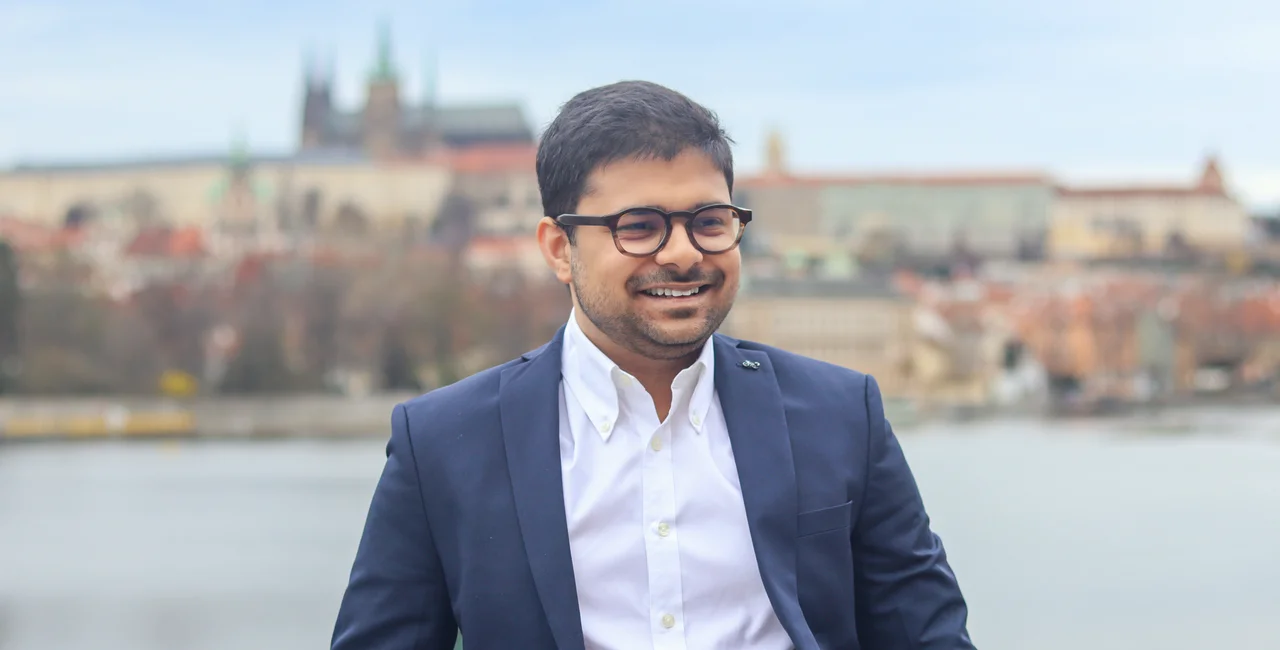In today’s world, simply saving money isn’t enough. Inflation erodes purchasing power, and keeping cash in a bank account means your money loses value over time. But investing can feel overwhelming, where to start, how to manage risks, and which strategies actually work?
We talked to Dhiraj Kapur, CFA, APS's Head of Treasury, to help us understand how to build wealth through smart financial decisions. Whether it’s the importance of saving and smart planning or how funds like APS Credit Fund SICAV create opportunities, this conversation will break down key investment principles in a way that’s clear and actionable. If you’ve ever wondered how to make your money work for you, what investment strategies actually pay off, or how to balance risk and return, this is the perfect place to start.
Can you tell us about your journey, how did you join APS, and what attracted you to the company?
I moved to Prague from Delhi in 2016 to study at the University of Economics. My partner is from Canada, so we fully qualify as expats. While studying, I worked as a credit analyst, and as I worked toward earning my CFA designation, one of the toughest financial exams globally, I transitioned into treasury. In 2021, I joined APS, an asset management firm that aligned with my passion for investments. Now, as Head of Treasury, I oversee liquidity and investments of the group and APS Credit Fund SICAV, managing tens of millions of euros yearly.
How do you personally approach investing? Do you follow any key principles that you think everyone should know?
For me, investing is based on three pillars: saving, financial discipline, and strategic capital allocation. Early in my career, I followed the 50-30-20 rule: 50 percent goes into savings, 30 percent goes into rent, and 20 percent covers monthly expenses. The key to wealth-building is keeping monthly expenses stable while your income grows. This ensures that as your career progresses, your savings automatically increase. A disciplined approach to savings and strategic investments allows for compounding wealth over time. Diversification is also key; everyone should invest in different asset classes like alternative investments, bonds, real estate, and stocks to balance risk and potential returns.
What about people who can’t afford to save 50% of their income?
Understandably, not everyone can follow the 50-30-20 rule, especially with inflation and rising costs in Prague. My advice would be to build an emergency fund that covers at least 3-6 months of living expenses and save whatever you can, even if it’s just CZK 1,000 per month. This ensures financial security in case of unexpected events.
Let me give you an example of how even saving CZK 1,000 per month over a long period of time can do magic. Take the number 72 and divide it by your annual return percentage. If you achieve a 10 percent return per year, your investment will double in 7.2 years (72 ÷ 10 = 7.2). So even if you save CZK 1,000 per month in seven years, you could double that amount. The key is starting somewhere, maintaining financial discipline, and making smart spending choices.
If one doesn’t have the expertise to pick the right investments, it’s best to invest in a professionally managed fund where experts make those decisions for you.
Why is investing important today, and what risks do people take by not investing?
One word: inflation. Let’s say you had CZK 100,000 in 2020 and didn’t invest it. Today, due to inflation, that money buys significantly less than it did back then. Over time, inflation erodes the value of cash, so simply keeping money in a bank account isn’t enough. The solution? Invest in assets that appreciate over time, such as real estate, gold, stocks (e.g., S&P 500), government bonds, and investment funds like ours at APS Credit Fund SICAV. These assets adjust with inflation and help maintain your purchasing power.
Can you share more about the SICAV fund you are mentioning?
For example, we at APS operate an investment fund specializing in non-performing loans (NPLs). We buy loans that banks want to offload, usually at a heavily discounted price. We then recover as much of the loan as possible, generating returns for investors. This strategy works well, especially during economic downturns when defaults increase. APS Credit Fund SICAV targets 10-12 percent annual returns. A minimum investment of 1 million CZK is required, so for example, if you invested CZK 1 million in 2021, by 2027-2028, you’d have CZK 1.4–1.6 million, a 50-60 percent return, outperforming inflation.
How does APS differentiate itself in the European market?
APS focuses on a unique investment opportunity: buying non-performing loans (NPLs) that people or companies have stopped paying. Banks prefer to sell these loans rather than handle them. Most NPLs are secured by assets, meaning APS can recover funds by selling collateral if the borrower cannot repay. Unlike traditional investments in stocks or real estate, this falls under alternative investments, which tend to perform well during economic downturns.
There’s always a debate about whether investing is truly safe. How do you view the risks here in the Czech Republic?
Investing in the Czech Republic is very attractive, especially for long-term investors, since holding your investment for more than three years is tax-free. Talking about risks, every investment carries risks, including SICAV funds and other ways of investing we talked about. APS specifically mitigates risk through diversification and secured loans, and we are subject to the same Czech National Bank regulations as other SICAV funds.
On the other hand, keeping money in a bank seems safe, but different risks, such as cyberattacks, also exist. Although the risks are small, they do exist. Many people worry about security when investing through apps. Banks, including Revolut, usually provide deposit insurance up to a certain amount, so even this is not entirely safe.
That’s why it’s important to follow sound financial principles, build an emergency fund first, and invest in different asset classes instead of not doing anything and putting all your eggs in one basket. That way, even if one investment doesn’t perform well, you still have reserves to fall back on.
Disclaimer: Trading financial instruments carries risks. Always ensure that you understand these risks before trading.












 Reading time: 5 minutes
Reading time: 5 minutes 


























